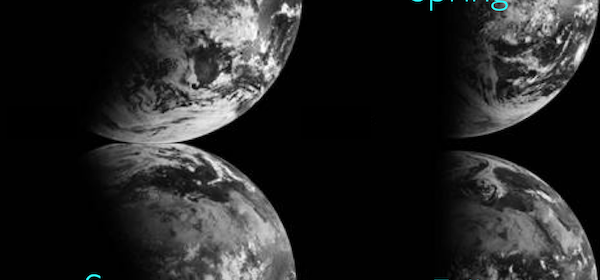
The Science & Math of Summer
Article Header
« Return to Main PageThe Science & Math of Summer
I think most of us would agree that summer is over once kids are back in school and summer vacations have ended. Days are getting shorter. Weather a bit cooler (depending on how far away from the equator we live, of course). But from a scientific perspective, something we love to do at Camp Infinity, summer isn't over until September 21 or 22 or 23 or 24. It has to do with the earth's tilt and somethings called solstices and equinoxes.
The year is divided into the four seasons based on the two equinoxes and the two solstices. The summer and winter solstices, which typically land around June 21 and December 22, mark the shortest and the longest days of the year. The autumnal and vernal equinoxes, which fall around September 23 and March 21, mark the points in the year when the day and the night are of equal lengths. Hence the word equinox, from the Latin roots meaning “equal night.” Astronomically speaking, these four solar events mark the middle of the seasons rather than their beginning and ending, but we separate the year into meteorological seasons which reflect the average temperature patterns and climate. - dictionary.com
When it comes to astronomical events, I find I usually learn concepts more from a picture. So check this out.

NASA / EUMETSAT
It shows how the earth's tilt affects the amount of sun we receive during each of the seasons. For the northern hemisphere (where Camp Infinity is located), we get our most direct rays from the sun during the summer months and our least amount during the winter.
Good News for Summer Lovers
As a scientist and mathematician I was curious (a characteristic we look for in Ci campers) why the solstice and equinox dates are not the same every year. And for you summer lovers, I was curious what were the earliest and latest dates and how often that occurs. After doing some googling (to reputable sources of course) I discovered 1) our calendar isn't mathematically precise enough and 2) the earth's orbit varies due to the gravitational forces from other planets. So our summer's official end can take place on any of four dates - September 21-24, although we haven't seen it fall on the 21st since 1000 CE, but it will happen again in 2092 and 2096. While the latest date, September 24, occurred in 1931 and will happen again in 2303 (you just gotta love math!!)
In the process of looking this up, I also discovered that mankind has always been interested in the weather and calendars and predicting solar events. For a cool video about Stonehenge, I highly recommend this website.
DID YOU KNOW?
Astronomers and meteorologists have different season?
astronomers use the precise dates and times of the solstices and equinoxes
meteorologists use March 1, June 1, September 1 and December 1
So, despite our daily routines telling us that our summer fun is over, enjoy the warm days and the pleasant evenings! And, remember, it won’t be long until summer is back!








